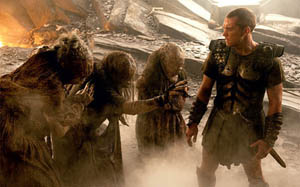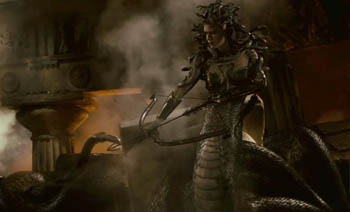|
Following in the grand tradition of remaking perfectly fine old movies instead of writing new ones, we now have a big-budget remake of the classic 1981 Ray Harryhausen tour de force Clash of the Titans. The new film is a pastiche of Greek myth, stuff they made up, and reused bits of the original film, some of which was also made up. Anyone thinking that this film could act as a substitute for actual study of Greek legends is going to be greeted with an embarrassingly low "F" when the tests are handed back. The title makes as little sense as ever, as there are no Titans featured in the film (made even more obvious by the new prologue that explains what the Titans actually are), but to properly justify the name they'd have had to re-write the story entirely. 
The humans of ancient Greece are in rebellion against the gods of Olympus. When a giant statue of Zeus is cast into the ocean by the men of the kingdom of Argos, Hades appears and assails them, inadvertantly killing the adoptive family of Perseus, half-human, half-god son of Zeus himself. The scheming Hades counsels Zeus to put the fear of God, so to speak, into the people, and confronts the king and queen of Argos over their rebellion, demanding that they offer up their daughter, Princess Andromeda, as a sacrifice to the sea beast the Kraken, lest it instead lay waste to the whole kingdom. Smarting from the death of his family and revealed to the people of Argos as a demigod, Perseus finds himself sent off on a mission to find the means of defeating the Kraken. Perseus, however, refuses to acknowledge his lofty status, and, rejecting Zeus's offers of assistance, determines to accomplish his mission as a man. The classic clichéd actor's lament of "what's my motivation?" is one I can easily imagine being spoken frequently on the set of this film; characters' actions seem too often rooted in murky reasons. Perseus has no real connection to Andromeda, nor is he even a citizen of Argos, making his mission to save her and/or the city more a matter of something he gets stuck with rather than something he has any personal stake in. The matter of Andromeda's impending doom is similarly unclear; her parents are understandably reticent to give up their daughter, but they don't seem to do much else about the situation, either. Shouldn't they be spearheading a mass exodus from the vulnerable costal city? The villain Calibos might well question why he's even in the film at all, as he appears in a grand total of three scenes and isn't terribly significant to the overall plot. A group of giant scorpions that spring forth from his blood might ask if they're even villains to begin with. They viciously attack the heroes, but are shortly thereafter seen to be ridden caravan-style across the wastes by strange, Dryad-like sorcerers. Either this practice is a recent development (and by "recent," I mean "since one day earlier, when Calibos bled everywhere"), or there were already giant scorpions in the desert that had arisen by other means. Maybe if a nice, friendly guy bleeds out there, a tame scorpion is born instead. 
To be fair, the ending works quite well, though it's undercut to a degree by the rather breathless pace and awkward setup preceding it. The monsters look spectacular (the Kraken in particular looks as though it must've taken forever and a day to render even a single frame), and Medusa has never looked better. But the fact remains that in terms of narrative, the 1981 film soundly trumps this one. Despite a wealth of hammy acting and special effects that were already dated by the time the film came out, it succeeded with a story that wasn't afraid to take its time setting up situations, establishing character relationships, and giving us reasons to care about what happens. The new incarnation, by contrast, lead-foots it towards the finish line almost from the moment the lights go down, as if it can't wait to be over and done with. Calibos, Andromeda, and all the gods save Zeus and Hades are generally elbowed out of the story, and for all of Perseus's impassioned assertions that he needs no help from the gods, the old Perseus got by with even less, with the winged stallion Pegasus now becoming a total deus ex machina in an oh-so-convenient way. I understand that audiences like action, and I have no issue with that. I like well-done action and spectacle as much as the next guy. But I also like a good story, and I'm hard-pressed to believe, whatever Hollywood seems to think, that most everyone else doesn't still like one, as well. -review by Matt Murray
|
|
||||||||